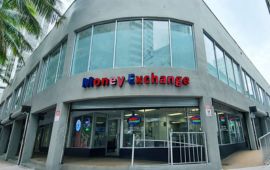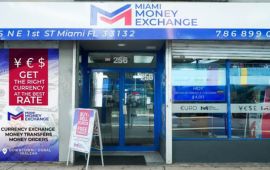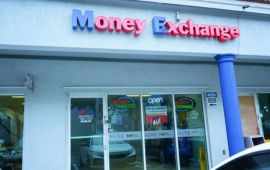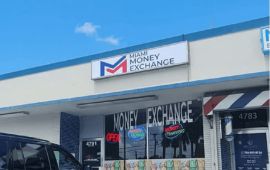Planning an international trip often comes with one common question: should I use ATMs abroad or exchange currency before I leave? The choice between ATM vs. currency exchange can impact how much you actually spend—and how much peace of mind you have while traveling.
While both options can get you local cash, each comes with its own set of costs, risks, and benefits. In this guide, we’ll break down the pros and cons of using international ATMs versus visiting a currency exchange service, like Miami Money Exchange, so you can make the smartest decision based on your destination, travel style, and budget.
How currency exchange houses work
Currency exchange providers, like Miami Money Exchange, allow travelers to convert their home currency into foreign cash, before or during their trip. These services specialize in handling multiple currencies and often offer transparent pricing, no hidden fees, and the ability to exchange small or large amounts in one go.
Advantages include:
- Knowing the rate upfront
- No reliance on ATM availability
- Avoiding foreign bank charges or limits
- Option to plan and budget in advance
How international ATMs work
When you use your debit or credit card at an ATM abroad, the machine dispenses local currency while your bank converts the amount based on current exchange rates. While this is convenient and widely accessible, many banks charge foreign transaction fees, ATM usage fees, and may apply less favorable exchange rates.
A typical ATM transaction abroad may involve:
- A withdrawal fee from the foreign bank
- A fee from your home bank
- A currency conversion margin added to the exchange r
Pros and Cons of Using ATMs Abroad
Using ATMs abroad is often seen as the fastest way to get local currency, but it’s not always the most cost-effective. Understanding the tradeoffs will help you avoid unnecessary fees and frustration during your trip.
Pros: Convenience and access almost anywhere
- Wide availability: ATMs are common in airports, hotels, banks, and commercial areas in most countries.
- Quick access to local currency: You can withdraw what you need, often 24/7.
- No need to carry large amounts of cash when traveling: Helps reduce risk while in transit.
Cons: Fees, limits, and less favorable rates
- Multiple hidden fees: You may be charged by both the foreign ATM and your own bank. Some charge flat fees, others a percentage of the withdrawal.
- Exchange rate uncertainty: The rate is often set by your card’s network (Visa, Mastercard) plus a markup.
- Daily withdrawal limits: You might not be able to withdraw as much as you need in a single transaction.
Pros and Cons of Currency Exchange Services
Currency exchange services remain a reliable and often more cost-efficient way to obtain foreign cash, especially if you prepare ahead. Let’s break down the main benefits and limitations of using a professional exchange provider like Miami Money Exchange.
Pros – Transparent rates and financial control
- No surprise fees: Reputable providers like Miami Money Exchange offer clear, upfront rates with no hidden commissions.
- Locked-in rates: You know exactly how much you’ll get, which helps you budget in advance.
- Broad currency selection: You can access not only common currencies like euros and pounds, but also less available ones.
- Security: Exchanging money before your trip means you avoid using unknown ATMs or carrying sensitive cards abroad.
Cons – Pre-trip planning and cash handling
- Requires preparation: To benefit from the best rates, you need to plan your exchange before departure.
- You’ll carry some cash: Carrying large sums isn’t always ideal, so it’s smart to exchange only what you’ll need initially.
- Limited hours (vs. ATMs 24/7): Exchange houses have business hours, though most offer convenient schedules.
When to Use Each Option?
Depending on your destination, travel length, and spending habits, one method may suit you better than the other. Here are some common travel scenarios and which option tends to work best.
Short trips to well-banked countries
If you’re going on a short vacation to a country with strong banking infrastructure—like the UK, France, or Japan—using an ATM may be convenient. Just make sure your card is accepted and you’re aware of international withdrawal fees.
Best for:
- Tech-savvy travelers
- Minimal cash needs
- Emergency-only withdrawals
Long stays or cash-heavy destinations
In countries where cash is preferred or you’re staying for several weeks or months, currency exchange services are often more cost-efficient. Exchanging a larger sum ahead of time can help you avoid repeated ATM fees and unpredictable rates.
Best for:
- Long-term travelers, students, remote workers
- Destinations where cards are less common (e.g., Latin America, parts of Asia)
- Those who want to lock in favorable rates
Traveling to countries with limited ATM access
Not all destinations have reliable ATM networks. In rural areas, islands, or countries with currency restrictions, you might not find a compatible or functioning ATM. In these cases, exchanging currency before your trip is essential.
Best for:
- Off-the-grid adventures
- Multi-country travel where ATM access is uncertain
- Travelers visiting remote or developing regions
Why Exchange Currency Before Your Trip with Miami Money Exchange
Exchanging your money before traveling allows you to avoid surprise fees, fluctuating ATM rates, and limited access to cash abroad. At Miami Money Exchange, you get clear rates, no hidden commissions, and a wide selection of currencies—ready when you are.
With multiple locations in Miami and more than 20 years of experience, we make it easy to start your trip prepared and confident.

Miami Money Exchange Downtown
Monday – Friday: 8:30 AM – 6:00 PM
Saturday: 8:30 AM – 5:00 PM
Sunday: 9:00 AM – 4:00 PM

Miami Money Exchange 256 Downtown
Monday – Friday: 8:00 AM – 6:30 PM
Saturday: 8:00 AM – 5:00 PM
Sunday: 9:00 AM – 4:00 PM

Miami Money Exchange Doral
Monday – Friday: 8:00 AM – 7:00 PM
Saturday: 8:00 AM – 5:00 PM
Sunday: 9:00 AM – 4:00 PM

